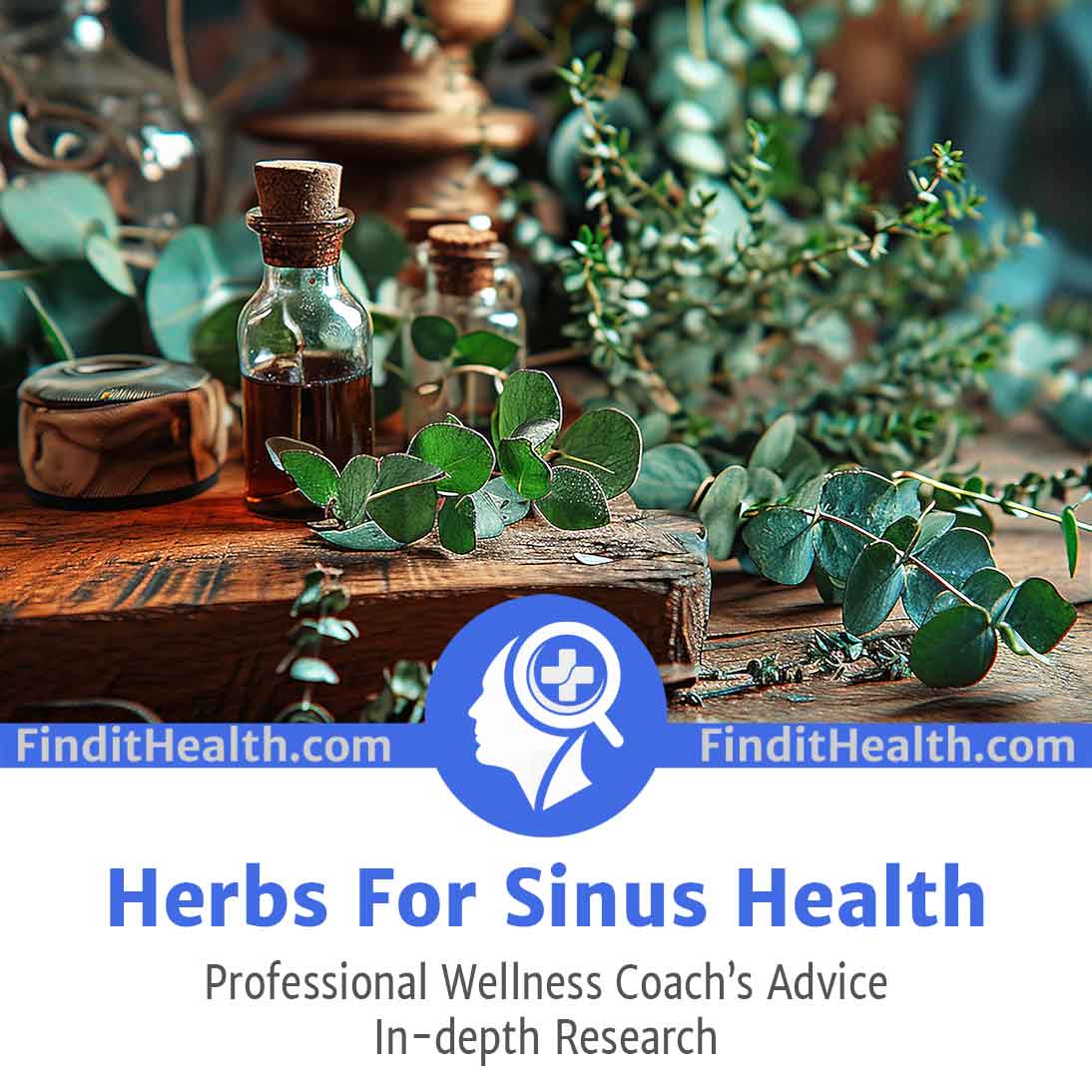
As director of the wellness coach team at Find It Health, I’ve witnessed countless people search for effective solutions to persistent sinus issues. In light of the growing trend of natural remedies, we studied herbs for sinus health at length. The purpose of our comprehensive study was to investigate how various herbs influence nasal passages and their potential for treating sinus infections.
According to a study published in the National Library of Medicine by Boram Lee, et al., 2022 herbal medicine combined with conventional therapy, may be more effective and safer than conventional therapy alone in the treatment of chronic rhinosinusitis.
If you’re seeking clarity on how herbs can optimize sinus health, this comprehensive guide is tailor-made for you. Rest assured, every piece of information is rooted in our commitment to genuine, research-based data. We’ll directly address the relevance and effectiveness of these natural alternatives.
List Of Herbs For Sinus Health
Sinus health is more than just avoiding a runny nose or combating nasal congestion.
It’s about ensuring the entire sinus cavities function optimally.
Over the years, as head of the wellness coach team at FindItHealth.com, I’ve delved deep into both traditional and contemporary solutions for sinus health. Today, we’ll share a curated list of herbal remedies that have proven beneficial against symptoms of sinusitis, both from research and personal experience.
Eucalyptus Oils:
- Usage: Often used in hot water for steam inhalation.
- Benefits: It can help clear nasal congestion and prevent bacterial infections that exacerbate sinusitis.
Peppermint:
- Usage: As an oil for diffusion or in tea.
- Benefits: Menthol in peppermint soothes sinus cavities, alleviating symptoms like a runny nose and pressure.
Goldenseal:
- Usage: Available in capsule or liquid extract form.
- Benefits: Known to combat bacterial infections, especially in the nasal passages.
Butterbur:
- Usage: As tablets or extracts.
- Benefits: Contains compounds that reduce inflammation, a boon for those with chronic sinusitis.
Nettle:
- Usage: Typically used in teas or capsules.
- Benefits: Acts as a natural antihistamine, reducing the severity of sinusitis symptoms.
Quercetin:
- Usage: Often available in supplement form.
- Benefits: This flavonoid stabilizes mast cells, reducing the release of histamines that cause inflammation.
Incorporating these herbal remedies into your routine can offer a natural approach to alleviating the common symptoms of sinusitis. Whether you’re grappling with a chronic case or merely seeking to ease the discomfort of nasal congestion, turning to nature might just be the solution you need.
Remember, while the benefits of these herbs are documented, it’s important to consult with a health professional before making them a regular part of your regimen. Not all herbs are suitable for everyone, especially if you’re currently on medication or have underlying health conditions.
SUBSCRIBE for FREE STRESS MANAGEMENT TECHNIQUES from our EXPERT COACHES!
Natural Ways Of Clearing Your Sinuses
As a wellness coach, I’ve also had my fair share of battles with sinus congestion. The sore throat, persistent nasal polyp, and ever-persistent sinus pressure made my days long and nights longer.
However, my journey, coupled with the wisdom of both Western and Chinese medicine, has led me to discover effective, natural solutions. Here’s a breakdown:
1. Nasal Irrigation with Warm Water:
- Usage: Use a neti pot or saline squeeze bottle.
- Benefits: It washes away pollen, and reduces fungal infections, and other irritants, significantly improving your quality of life. Plus, warm water offers added comfort.
2. Stay Hydrated:
- Usage: Drink at least 8 glasses of water daily.
- Benefits: Keeping mucous membranes moist is key. It helps reduce sinus symptoms like dryness and irritation.
3. Eucalyptus Oil:
- Usage: Add a few drops in steaming water and inhale.
- Benefits: This powerful agent alleviates sinus pressure and combats the root causes of acute sinusitis.
4. Acupressure:
- Usage: Massage specific points on your face.
- Benefits: An art from Chinese medicine, it aids in clearing blockages and easing sinus symptoms.
5. Antioxidant-rich Foods:
- Usage: Integrate berries, nuts, dark chocolate, and spinach into your diet.
- Benefits: They pack essential nutrients, combat allergic reactions, and boost your overall immune system.
6. Avoid Air Pollutants:
- Usage: Use air purifiers and reduce exposure to outdoor air pollution.
- Benefits: Cleaner air reduces the risk of fungal infections and other irritants aggravating the sinuses.
7. Spicy Foods:
- Usage: Incorporate natural spices like ginger, garlic, and cayenne pepper into meals.
- Benefits: These spices act as natural decongestants, alleviating sinus pressure and improving nasal flow.
8. Warm Fluids:
- Usage: Drink teas, especially those infused with beneficial herbs.
- Benefits: The warmth soothes a sore throat, while some herbs target sinus symptoms directly.
Incorporating these practices significantly enhanced my daily routines, improving not just my sinuses but my overall well-being. However, while these methods are beneficial, it’s essential to remember that everyone’s body is different.
If sinus symptoms persist, or if you suspect complications like nasal polyps or severe allergic reactions, it’s crucial to consult with a health professional. It’s all about balance – adopting natural solutions while recognizing when professional intervention is necessary to breathe easier and live better.
SUBSCRIBE for FREE STRESS MANAGEMENT TECHNIQUES from our EXPERT COACHES!
The Dangers Of a Sinus Infection
While many perceive sinus infections as mere discomforts, they have potential risks beyond the common stuffy nose or headache. For instance, when a sinus infection transitions from viral to bacterial, its severity and duration can increase significantly. Prolonged neglect can escalate these infections, potentially leading to more severe health complications.
Chronic untreated sinusitis may also pave the way for the formation of nasal polyps, which can further obstruct breathing. It’s vital to recognize that these infections are not just temporary inconveniences; they come with real dangers if left unchecked.
It is important to note that this article is intended for informational purposes only. It is not a substitute for professional medical advice, diagnosis, or treatment. Always seek the advice of your physician or another qualified health provider with any questions you may have regarding a medical condition or treatment.
Defining Sinusitis: A sinus infection, or sinusitis, occurs when the nasal cavities become swollen, inflamed, and infected. In prolonged cases, bacterial sinus infections can invade the nasal cavities.
1. Types of Sinus Infections:
- Viral Sinus Infection: Often mistaken for a common cold, it can lead to facial pain and lasts for about 7-10 days.
- Bacterial Sinus Infection: If sinus infection symptoms persist beyond ten days, especially with fever, it might be bacterial in nature.
2. Sinus Infection Symptoms:
- A persistent stuffy nose
- Facial pain and tenderness
- A cough or throat irritation, which might worsen at night
- Fatigue or irritability
- Reduced sense of smell and taste
Dangers of Untreated Sinusitis:
- Chronic Sinusitis: If left untreated, acute sinusitis might turn chronic, affecting your quality of life.
- Spreading of Infection: The infection can spread to the bones, skin, or even the brain, which can be life-threatening.
- Vision Problems: Swelling might cause pressure on the eye, leading to vision problems, even potential blindness.
- Breathing Trouble: Especially in cases with nasal polyps, untreated sinusitis can lead to breathing issues.
Natural Remedies: While severe or prolonged symptoms should be discussed with a healthcare professional, some natural remedies have been found beneficial:
- Fresh Garlic: This natural antibiotic can be consumed daily to combat bacterial and viral infections.
- Herbal Medicines: Certain herbal formulations might provide relief. Always discuss with a healthcare provider before starting any herbal regimen.
- Nasal Drops: Saline nasal drops, applied 2-3 times per day, can help in clearing the nasal cavities and offer relief from a stuffy nose.
However, it’s essential to be wary of the potential dangers. If you face persistent sinus infection symptoms, especially severe facial pain, it might be time to discuss more intensive treatments, like Endoscopic Sinus Surgery, with your healthcare provider.
When to Seek Medical Attention: If home remedies don’t bring relief in a few days, it might be time to see a doctor, especially if you:
- Have three or more sinus infections in a year.
- Experience symptoms longer than 10 days without relief.
- Face extreme symptoms, like sharp facial pain or high fever.
While sinus infections might seem like a simple inconvenience, it’s vital to recognize their potential severity. By staying informed and being proactive, you can ensure that a mere stuffy nose doesn’t evolve into a more significant health issue. Always remember: your health is an investment, not an expense.
Frequently Asked Questions
What herbs clean out your sinuses?
It has been found that Eucalyptus and peppermint have antibacterial and antifungal properties that can help clear the paranasal sinuses.
What are some natural ways to cure sinusitis?
There are several natural ways to heal your sinuses naturally, including drinking clean water, inhaling steam, and using cold compresses.
What plants are good for sinus problems?
Sinus problems can be alleviated with Eucalyptus, peppermint, and ginger plants since they possess antiviral properties.
What kills fungus in the sinuses?
The antifungal properties of oregano oil and garlic are well known and are effective in combating fungal infections in the sinuses due to their antifungal properties.
Conclusion
After an in-depth analysis conducted by Find It Health, it’s evident that herbs play a significant role in sinus health management. These natural remedies offer an alternative approach for those hesitant to rely solely on conventional treatments. Their potent anti-inflammatory and antibacterial properties can alleviate sinus symptoms, reducing the need for over-the-counter drugs.
However, as with all health-related matters, it’s essential to consult a medical professional before introducing new treatments into your routine. Remember, the key is finding what works best for your unique situation, and herbs just might be the answer for many battling sinus issues.

